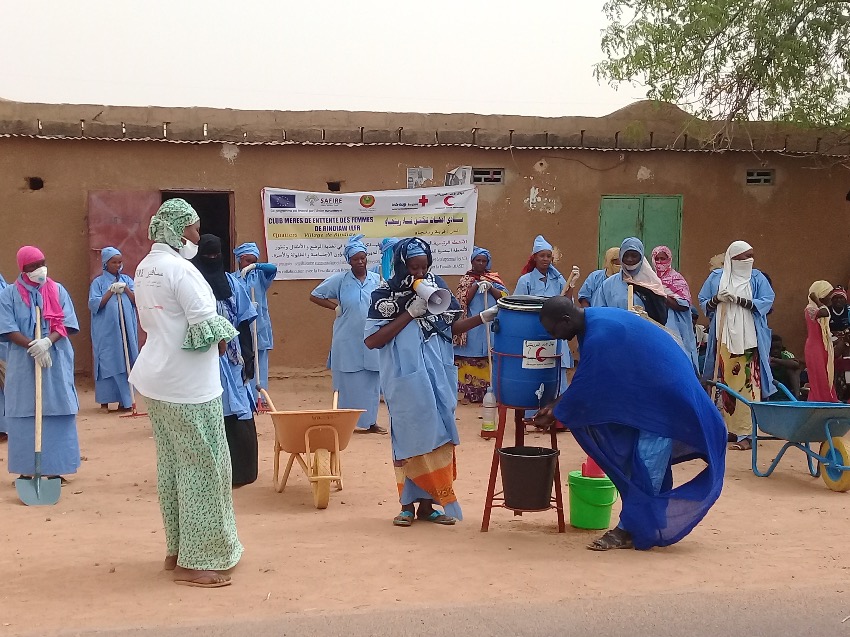Enhancing food security and resilience in Mauritania
According to the United Nations Development Programme (UNDP) Human Development Index, Mauritania is one of the poorest countries in the world. Located in the African Sahel region, it is vulnerable to hazards such as droughts and flooding. Over two thirds of the Mauritanian territory consists of desert, and less than 1% of its land is usable for agriculture. Most of the population’s livelihoods derive from traditional agriculture and livestock farming, making them heavily dependent on rainfall. However, the impacts of climate change have resulted in unpredictable seasonal rains, desertification, and other critical climactic conditions. This is increasingly exposing the population to cyclical food insecurity and malnutrition, land degradation, poverty, and disrupted livelihoods. Pregnant and breastfeeding women, as well as children below the age of five, are particularly affected.
To respond to this multitude of challenges, in 2019 the Mauritanian Ministry of Employment, Youth and Sports launched the “Programme de Sécurité Alimentaire, Formation, Insertion, Résilience et Emploi” (Food Security, Training, Integration, Resilience and Employment Programme). Financed by the European Union’s (EU) Emergency Trust Fund for Africa, the four-year programme brings together 14 national and international organisations through three consortia.

The French Red Cross leads the consortium “Parcours d’Insertion Socioprofessionelle et Vers d’Emploi” (Pathway to Social Integration and Employment) – an economic, social, and environmental programme which targets women and young people in areas most affected by unemployment and food insecurity. On the one hand, the project aims to improve the employability of young people through dedicated youth spaces offering training and support for employment and entrepreneurship, such as learning agricultural practices. On the other hand, it combats food and nutritional insecurity by mobilising so-called “Clubs de Mères” (Mothers´ Clubs) to enhance agricultural production and promote good food and nutritional practices in the villages with the highest rates of poverty, malnutrition, and unemployment, particularly among young people and women. “My day is rather unpredictable”, says Alioune Birane BA, Assistant Project Manager. “It starts in the office and then materialises in the field. We often work as a team and constantly assist and exchange with beneficiaries. Sometimes, I go to the market to see how households function and the current prices of consumer products. I talk to all the communities in the area to raise awareness.”
Project partners aim to boost food security and livelihood resilience in the Gorgol region in a holistic way by applying a community-based approach, which places the local population, most notably women, at its centre. For example, to reduce the exposure of individual households to food insecurity and health-related issues, ten Mothers’ Clubs were established in the Kaédi commune. The Mothers’ Clubs are voluntary groups of women who meet to discuss and disseminate topics in the fields of maternal and child health, including by holding information sessions for pregnant and breastfeeding women on hygiene, sanitation, and nutrition. “The project has awakened changes in the behaviour of the women in our community”, says Rouguiyatou Samba, President of the “Djokere Endam” Mothers’ Club in Kaédi. “Training is focused on how to prevent malnutrition in children. It allows us to talk about appropriate solutions and identify good practices to improve the nutrition of infants and young children.”

The development of economic initiatives is another key element of the Mothers’ Clubs’ activities, which is necessary to ensure the resilience of its members and the most vulnerable communities of the local population. For example, cooking workshops, as well as training in processing cereal to flour or manufacturing artisanal soap to sell are organised, followed by courses in financial management and marketing to further strengthen income-generating skills. Between January and April 2021, the Mother’s Clubs made over 1,900 Mauritanian ouguiya (MRU) in profit each month as a result of this comprehensive training package.
In the face of the COVID-19 pandemic, the Mother’s Clubs have played an important role in promoting good hygiene and sanitation practices to help contain the spread of the outbreak. The emergence of COVID-19 was accompanied by a dangerous spread of misinformation. Trusted, clear, and effective communication and engagement approaches became key to ensuring that fear and rumours do not jeopardise the COVID-19 response. Thus, in May 2020, a community feedback mechanism was set up by the Mother’s Clubs to collect and analyse rumours and combat the spread of misinformation related to the pandemic.
The first phase of the project was marked by its institutional establishment, the development of activity strategies, and the coordination of employment projects, as well as relations with national authorities in organising the first piloting committee with representatives from the EU and partner Ministries. For the remainder of the programme, project partners will build on this organisational basis by creating Youth Spaces with dedicated services in support of employment and entrepreneurship, training young learners in the Agricultural Test Area, and operationalising the Mothers´ Clubs. Overall, the programme promotes self-sufficiency and increases resilience to climate-induced hazards.
Basic information
Activity name
Programme de Sécurité Alimentaire, Formation, Insertion, Résilience et Emploi (SAFIRE)
Country
Mauritania
Duration
March 2019 - February 2023
Partners
French Red Cross, Mauritanian Red Crescent, Terre des Hommes Italia, GRDR-Migration-Citoyenneté-developpement, ECODEV, OXFAM, GRET
Read more about the programme (in French) here.

